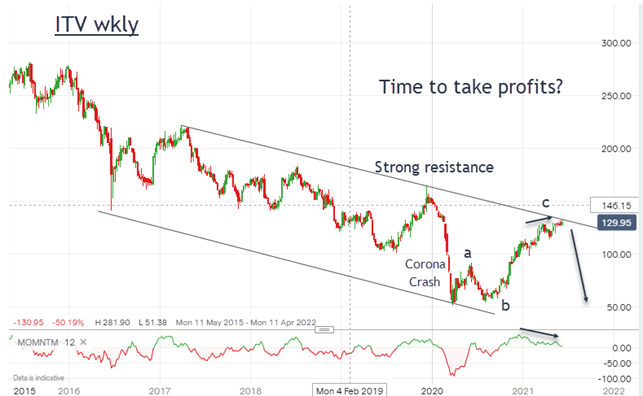Chart of the week: what to do with this top FTSE 250 stock
14th June 2021 12:22
by John Burford from interactive investor
After watching its share price more than double in a year, our chartist discusses what might happen next.

Are you watching ITV?
Shares in commercial broadcaster ITV (LSE:ITV) have been on a slide since the 2015 high was made at the £3 area. It then entered a lengthy bear trend and made a low last March at the Corona Crash low of 52p. So, sentiment towards it had been trending lower for years as ad revenue was in decline and viewing figures were in a major battle with the streaming services.
The Corona Crash low appeared to be the final climax low and, since then, the shares have advanced to the current 130p rally high and a more than doubling off last year's low.
The pandemic certainly halted new productions and viewing figures were hit hard during the lockdowns. Love Island became 'Deserted Island! But with the general expectation of restrictions being eased and 'normal' operations being resumed soon, investors have become much more bullish. However, the competition from the streamers is not going away and ITV is being forced to spend a lot more on production values to keep up with them.
- ITV targets promotion to FTSE 100 after Q1 update
- ii view: ITV accelerates its digital push
- Read more of our articles on UK shares
The big question is ad revenue – and any set-back in the economic growth assumptions many are making (and these are huge) would be a negative for the shares. So I am making a case for taking profits – and the chart is backing me up.

Past performance is not a guide to future performance.
The long-term weekly chart shows the bear trend off the 2015 all-time high and, right away, I show an excellent trading channel joining important highs and lows on the way down. From the Corona Crash low a year or so ago, the rally has made it to the upper trendline in a clear a-b-c pattern. If confirmed, this is a bearish sign as three waves are always corrective to the one larger trend.
With the market hitting up against the major resistance line at the 130p area and on a momentum divergence, odds are that a decline lays in store. I believe it prudent to take at least some profits here.
- Bill Ackman: THE serious threat to investors in 2021
- Read more about behavioural finance
- Check out our award-winning stocks and shares ISA
And this brings up an important point for traders and investors alike- when to take profits. Most advice and tips you read involves which shares to buy. Rarely will you see one that advises selling. I realise that selling a share that you have bought at a good price is a very difficult decision. There is the temptation to believe that as it is in a solid uptrend, it will keep on going. That feeling must be resisted. Remember, shares are not the marrying kind, and the sky is not the limit!
These articles are provided for information purposes only. Occasionally, an opinion about whether to buy or sell a specific investment may be provided by third parties. The content is not intended to be a personal recommendation to buy or sell any financial instrument or product, or to adopt any investment strategy as it is not provided based on an assessment of your investing knowledge and experience, your financial situation or your investment objectives. The value of your investments, and the income derived from them, may go down as well as up. You may not get back all the money that you invest. The investments referred to in this article may not be suitable for all investors, and if in doubt, an investor should seek advice from a qualified investment adviser.
Full performance can be found on the company or index summary page on the interactive investor website. Simply click on the company's or index name highlighted in the article.
Disclosure
We use a combination of fundamental and technical analysis in forming our view as to the valuation and prospects of an investment. Where relevant we have set out those particular matters we think are important in the above article, but further detail can be found here.
Please note that our article on this investment should not be considered to be a regular publication.
Details of all recommendations issued by ii during the previous 12-month period can be found here.
ii adheres to a strict code of conduct. Contributors may hold shares or have other interests in companies included in these portfolios, which could create a conflict of interests. Contributors intending to write about any financial instruments in which they have an interest are required to disclose such interest to ii and in the article itself. ii will at all times consider whether such interest impairs the objectivity of the recommendation.
In addition, individuals involved in the production of investment articles are subject to a personal account dealing restriction, which prevents them from placing a transaction in the specified instrument(s) for a period before and for five working days after such publication. This is to avoid personal interests conflicting with the interests of the recipients of those investment articles.